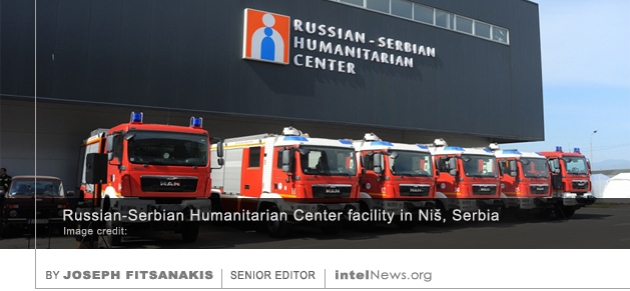Russian aid center in Serbia rejects claims that it is an intelligence base
July 13, 2017 Leave a comment
 Staff at a Russian disaster relief center in southern Serbia have rejected claims by American officials that the facility operates as an espionage arm of Moscow’s foreign policy in the Balkans. The Russian-Serbian Humanitarian Center was built in 2012, at a cost of nearly $40 million, following an agreement between Belgrade and Moscow. Its stated mission is to “provide humanitarian emergency response in Serbia and other Balkan states” through the provision of humanitarian assistance to those in need and training local emergency response crews. The center is located in the outskirts of Serbia’s fourth largest city of Niš, not far from the country’s border with Kosovo, a former Serbian province that unilaterally declared independence in 2008. Serbia refuses to recognize Kosovo’s independence, a decision that is strongly backed by Russia. It is also close to the headquarters of the North Atlantic Treaty Organization’s peacekeeping force stationed in Kosovo, which houses 4,000 international troops, including 600 Americans.
Staff at a Russian disaster relief center in southern Serbia have rejected claims by American officials that the facility operates as an espionage arm of Moscow’s foreign policy in the Balkans. The Russian-Serbian Humanitarian Center was built in 2012, at a cost of nearly $40 million, following an agreement between Belgrade and Moscow. Its stated mission is to “provide humanitarian emergency response in Serbia and other Balkan states” through the provision of humanitarian assistance to those in need and training local emergency response crews. The center is located in the outskirts of Serbia’s fourth largest city of Niš, not far from the country’s border with Kosovo, a former Serbian province that unilaterally declared independence in 2008. Serbia refuses to recognize Kosovo’s independence, a decision that is strongly backed by Russia. It is also close to the headquarters of the North Atlantic Treaty Organization’s peacekeeping force stationed in Kosovo, which houses 4,000 international troops, including 600 Americans.
Western officials have raised concerns that the disaster relief center is in reality an intelligence base, from which Russia conducts some of its espionage operations in the Western Balkans. It has also been suggested that the center could operate as a military base in a potential Russian military operation in the former communist state. In June, the United States Deputy Assistant Secretary of State for European and Eurasian Affairs, Hoyt Brian Yee, publicly described the compound as “the so-called humanitarian center” in Serbia. Speaking during a US Senate hearing on southeastern European politics, Yee said the Department of State was concerned about the center’s unofficial use. He also expressed reservations about Moscow’s request that the Serbian government grants the center diplomatic immunity, similar to that which covers the activities of the Russian embassy in Belgrade.
Moscow responded to American allegations of espionage by inviting local and international media representatives to the center on Wednesday. The center’s co-director, Viacheslav Vlasenko, told reporters that the center was “very open”, adding that its staff consisted of 15 Serbs and five Russians who were dispatched to Serbia from Russia’s Ministry of Emergency Situations, known as EMERCOM. Vlasenko said that Moscow’s request for diplomatic immunity for the center was solely aimed at reducing the annual taxes that the facility had to pay.
Regular readers of intelNews will recall allegations made last October by authorities in Serbia’s neighboring state of Montenegro —later repeated by Britain— that nationalists from Russia and Serbia were behind a failed plot to kill the country’s then-Prime Minister Milo Dukanović and spark a pro-Russian coup in the country. The allegations surfaced after 20 Serbians and Montenegrins were arrested by police in Montenegro on election day, October 16, as Montenegrins were voting across the Balkan country of 650,000 people. In response to allegations that the coup had been hatched in neighboring Serbia, Serbian Prime Minister Aleksandar Vučić said that he would not allow Serbia to “act as the puppet of world powers”, a comment that was clearly directed at Moscow. Russia has vehemently denied the allegations.
► Author: Joseph Fitsanakis | Date: 13 July 2017 | Permalink






